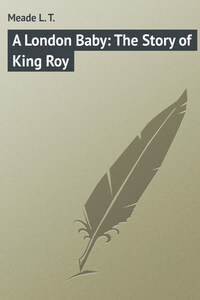Prologue
I first saw King Roy on a lovely summer’s evening near Hyde Park. It was a Sunday evening, and I recollect there was a light pleasant breeze, which just tempered the heat, and once in a playful moment caught King Roy’s small velvet cap and tossed it off his curly head. Then ensued a race, a scuffle, and a laugh, in which I, although a stranger to his Majesty, joined. This induced me to consider him more attentively, and thus to study well one of the bonniest baby faces it has ever been my lot to behold. For – yes, it is true – King Roy was only a king in right of his babyhood, being no higher up in this world’s social scale than a carpenter’s son.
A brawny, large, and handsome man was the father, on whose shoulder the little fellow was riding, while a demure, pale-faced sister of about ten, walked by the side of the two. Father and little sister might have been met with anywhere, any day, but the baby once in a lifetime.
He was a rounded and curved creature – not an angle anywhere about him; his chin was a dimple, his lips rose-buds, his eyes sapphires; his little head was a mass of tangled golden curls; sunshine seemed to kiss him all over – hair, eyes, lips, even to the small pink toes – for he had pulled off his shoes and stockings, which were held tightly in two fat hands. He was full of heart-sunshine too, for his gay voice babbled continually, saying words, to our deaf ears meaningless, but which, doubtless, the angels understood very well.
“Ah boo!” was his remark to me, and he pointed with his small finger. Following the direction of the tiny finger, I saw a fly sailing slowly through space. Between King Roy and that fly there was doubtless some untold sympathy. As though attracted by his admiration it came nearer. Yes, he must have been giving it some message, for he babbled more sweetly than before. The fly sailed away; it looked important with big tidings, as it went higher into the blue, and the little group of three turning Hyde Park Corner disappeared from my sight.
I never saw King Roy again, but afterwards I heard a story about him – a story which so moved me that it may some others; so I tell it here.
John Henry Warden was a carpenter by trade; he was a well-to-do workman, employed constantly in a profitable and moneymaking business. God had also endowed him with excellent mental and physical powers. Sickness was unknown to this man, and as to the many heart-aches which come into the daily measure of most other lives, they were strangers to his nature. He did not understand moping; he had no sympathy with gloom. He considered himself a successful man, he was also ambitious; he meant, if he lived, to leave this world in a much higher position than when he had entered it. He was very much respected by his neighbours, for he was a strictly honourable, upright, and honest man. But though respected he was not loved. It was his misfortune that never yet in all his life had he either awakened or given love. And yet he was not without those closest ties which knit hearts to hearts. He had been a husband; he was now a widower and a father. He had married a young and beautiful girl, a sensitive creature who needed love as the plants need sunshine. She lived with him for a little over ten years, all the time, year after year, fading slowly but surely. Then she died; no one said she died of a broken heart – Warden least of all suspected it. He regretted her loss, for he considered a mother the right person to bring up her children, and he felt it a pity that she should have left all the good things of this life, which by-and-by he might have provided for her. He had even expressed this regret to her as she lay on her death-bed, and her answer had surprised him.
“But there’ll be love up in heaven. I’m so hungry for love.”
The wife and mother died, and Warden did not fret. It would have been very sinful to fret, for although he scarcely considered himself religious, yet he had a respect for God’s dispensations. Yes, he was outwardly a model character: he worked early and late; he saved money; he was never in debt; he defrauded no man; his evenings were spent either in attending lectures of working men like himself or studying the subjects he loved at home; he never drank; he never swore; he was looked up to, and brought forward as an example to follow for many a poor drunken wretch. But yet in God’s sight that poor drunkard, struggling, though struggling feebly, to repent, was far nearer, far dearer than this Pharisee, who had never yet known love, human or divine.
Warden’s wife died, leaving to his care two children. Faith, the elder, nine years of age at the time, was a pale, silent child. She knew enough of her father’s character to suppress all her real self before him. Roy, the younger, aged three months when his mother left him, showed from his earliest moments a disposition differing widely from either father or mother. By-and-by that sweet soul would develop the love of the one parent without her weakness, the strength of the other without his hardness. Warden, in reality loving no one, having never in all his existence experienced either the joy or the pain of true love, yet believed that he had this feeling for his boy. He was undoubtedly very proud of the little child; he was his son, he was beautiful. Warden, when he looked at him, dreamed dreams, in which he saw himself the founder of a house and a name. He would make his boy a gentleman; he worked ever harder and harder as this thought grew and gathered strength within him. As to Faith, she was useful in helping and training Roy. For her own individual existence he had no special thought. She was but a girl; she would grow up another weak, good, loving creature like her mother. She might or might not marry. It did not greatly matter. Of course he would do his duty by her – for whenever had John Warden, in his own opinion, neglected that? She should be educated; she should have her chance in life. But he had no high opinion of women, and, though he thought he loved his son, he did not even pretend to his own heart that he cared for little Faith.














